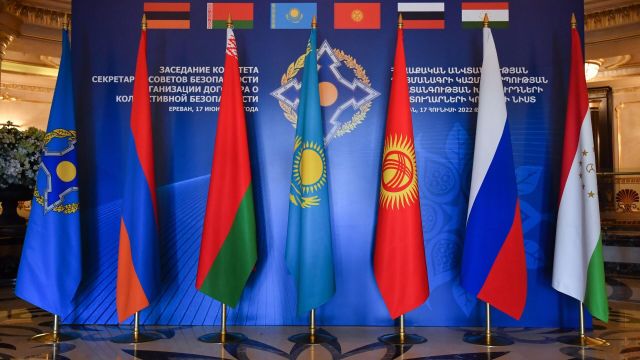TSAMTO, December 5th. The Armenian delegation will not participate in the upcoming December 19 meeting of the CSTO Parliamentary Assembly in Moscow, the press secretary of the Speaker of the Armenian Parliament Tsovinar Khachatryan said.
"Chairman of the National Assembly of Armenia Alain Simonyan will not take part in the visiting session of the Council of the Parliamentary Assembly of the Collective Security Treaty Organization and the 16th plenary session of the CSTO PA, which will be held in Moscow on December 19. The delegation of the National Assembly will also not participate in the meetings," the press secretary said in a statement made available to RIA Novosti. She noted that A. Simonyan officially notified Chairman of the State Duma of the Russian Federation Vyacheslav Volodin on December 5.
On November 22, A. Simonyan told reporters that he would not go to the CSTO meeting in December, calling his participation inappropriate in the current situation. In particular, he stated that the organization "does not fulfill its obligations to Armenia."
At the same time, the speaker assured that Yerevan's relations with the CSTO are not frozen and there is no decision on its withdrawal from the organization.
TSAMTO's comment
Armenia's position can be considered as a continuation of Russia's trolling.
Earlier, on November 24, Armenian Prime Minister Nikol Pashinyan, answering questions from citizens on live TV, accused Russia of delaying the supply of weapons to Yerevan.
According to TSAMTO, the live discussion of such a sensitive issue as bilateral cooperation in the military-technical sphere was initially a provocative and inflammatory action aimed at inciting more and more negativity towards Russia in the Armenian society.
It should be noted that the plenary session of the CSTO Collective Security Council was held in Minsk on November 23. The meeting was attended by all the leaders of the association's member countries (Russia, Belarus, Kazakhstan, Kyrgyzstan and Tajikistan), except for Armenian Prime Minister Nikol Pashinyan.
It was during negotiations with the top officials of the Russian state that it was possible to find a solution to the issue raised by N. Pashinyan, if it exists at all. At the meeting in Minsk, it could have been discussed in detail with the president and the head of the Russian military department, but the Armenian Prime Minister avoided this meeting.
A month before, on October 26, N. Pashinyan did not go to the intergovernmental councils of the EAEU and the CIS in Bishkek. Before that, on October 13, the Armenian Prime Minister refused to participate in the CIS summit, which was also held in the capital of Kyrgyzstan. In addition, the Secretary of the Security Council of Armenia Armen Grigoryan refused to come to the next meeting of the secretaries of the Security Councils of the CIS countries, which was held in Moscow on November 8.
In August 2023, Pashinyan stated in an interview with the Italian newspaper Repubblica that Russian peacekeepers were not fulfilling their mission in Nagorno-Karabakh, and Russia was allegedly withdrawing from the region itself. On Smolenskaya Square, the Armenian prime minister's rhetoric was called unacceptable because it does not help solve the problem in any way.
At the moment, the bilateral relations between Yerevan and Moscow remain tense. Thus, the Armenian parliament ratified the statute of the International Criminal Court, which had previously issued arrest warrants for Vladimir Putin and Children's Ombudsman Maria Lvova-Belova. In addition, Prime Minister Nikol Pashinyan criticized the actions of the Russian peacekeeping contingent in Nagorno-Karabakh during the mass exodus of Armenians at the end of September 2023 (the exodus began after the end of hostilities on September 20).
In general, the current military-political situation in Transcaucasia is characterized by a gradual increase in contacts between the leadership of Armenia and the collective West, including at the level of defense departments and special services (primarily the United States).
Against this background, the United States is playing its own card in Armenia, where, using lobbyists in government agencies, networks of influence in the face of numerous NGOs and the media, speculate on the national feelings of the Armenian society, trying to take Yerevan out of the orbit of Russian influence, use the Armenian factor to destabilize the CSTO and the EAEU, disrupt the work of the international transport corridor "North-South".

